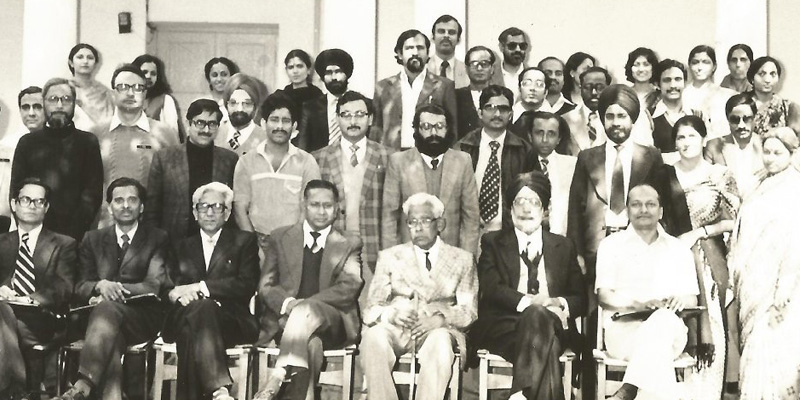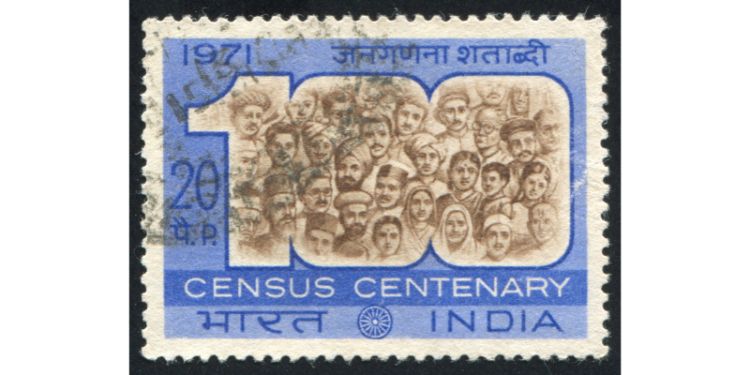Research project
The Other From Within: Indian Anthropologists and the Birth of the Nation
- Start date: 1 September 2019
- End date: 31 March 2024
- Funder: Arts and Humanities Research Council
- Primary investigator: Professor WiIliam Gould
- Co-investigators: Dr Arunima Bhattacharya (formerly University of Leeds; Postdoctoral Research Assistant)
- External co-investigators: Professor Crispin Bates (University of Edinburgh), Dr Jesus Chairez-Garza (University of Manchester), Dr Debojyoti Das (University of Manchester)

Description
This project traces the development of anthropology as an academic discipline in India and as an instrument of state formation and decolonisation in the early- to mid-twentieth century. Rather than simply looking at anthropology as an outgrowth of colonial ideas, we also try to answer questions like:
- Where do the intellectual origins of Indian anthropology lie?
- Who were these anthropologists anyway? Who were they influenced by?
- How did Indian anthropologists contribute to global networks that sought to re-shape the outlook and legacy of the discipline, especially in a world marching towards decolonisation?
- How was this aided or impeded by the role of India’s government and other academic and cultural institutions?
- Did India’s developmental path benefit from the knowledge that these anthropologists produce?
- And how crucial was the contribution of interlocutors and collaborators to Indian anthropology?
Apart from tracing the many circulations, networks, and movements of ideas, intellectuals, and their practices, we also focus on the subjects of their discipline: who were the people that these anthropologists studied? How did they react to these researchers’ work?

A stamp commemorating the centenary of the Indian census in 1971. The Indian census is one of the sources used for this project. Image credit: Sergey Nezhinkiy/Alamy Stock Photo
Contributions to the Field
The first of its kind, this project examines in a holistic and systematic way how anthropology shaped the relationship between India’s state and its subjects, and how it contributed to what we describe as India’s ‘intellectual decolonisation’ in the years between 1910-1970.
The history of anthropology in India is largely underdeveloped. There are two reasons for this:
- First, the attempts to trace the history of anthropology across the world are relatively new, starting in the late 1980s. Not surprisingly, these inquiries have had little to say about the growth of anthropology in the Global South, let alone India.
- Secondly, the role of Indian anthropologists working in the twentieth century has been overshadowed by the focus on the role of colonial ethnographers and the legacy of the colonial state in South Asia.
A more thorough engagement with the lives and careers of Indian academics is necessary to reveal that the tensions of anthropological knowledge in India were not merely a European problem, nor were they resolved by independence. In fact, after 1947, newer questions about decolonisation, development, national unity, and ‘modernity’ often exacerbated these tensions.
The first generations of Indian social scientists were British-educated and often accepted many western theories about their own people. Yet, the rise of nationalist politics awoke them to the problems of colonial disciplines like anthropology, pushing them to shape newer ways of defining India, both at home and abroad. By tracing the formation of an Indian school of anthropology, this study sheds much needed light on the often neglected history of intellectual decolonisation.
The legacy of these ideological battles may be found not only in the writings of these scholars but also in the institutions they left behind. Organisations such as the Anthropological Survey of India, the Indian Sociological Society, the Bombay Anthropological Society and the Ethnographic and Folk Culture Society, for example, defined the main characteristics of Indian culture and discarded what they saw as foreign elements. These institutions had strong international connections. Their staff collaborated, for example, with the Ford Foundation, UNESCO, and the Pitts Rivers Museum in Oxford.
Bearing these diverse elements of anthropology in India in mind, this project adopts a holistic, inter-disciplinary approach that combines elements of intellectual, institutional, and social history.
Case Study
D. N. Majumdar
One of the most important figures in early post-independence India’s social science, was the anthropologist D. N. Majumdar, who worked on ways of connecting anthropology to some of the key scientific advances of the time.
In some of his work he allied with India’s most important statistician, P. C. Mahalanobis, to make use of census data from 1941, exploring the physical characteristics of different communities in terms of statistical correlations. These kinds of studies connected out to other large-scale national projects of physical anthropology which tried to make sense of the ‘origins’ of people at India’s margins.
This included the famous Rup Kund find, in which hundreds of sets of bodily remains were found in one site in the 1940s Himalayan region, and studied in the 1950s. Anthropologists (including Majumdar) and scientists eventually discovered that the bodies had been victims of disasters taking place over 1000 years apart. Unexpectedly, the skeletal remains were traced to far-flung origins, including the Mediterranean region as well as South Asia. Some of these remains are still housed in the University of Lucknow, Department of Anthropology, and in the 1950s they contributed to debates about national trends in Indian anthropology.
Follow this link and download ‘Measuring Hierarchy’ to read more about this case study.
Blogs
Here is a selection of blogs on the history of Indian anthropology authored by the project team. Follow the links to download the documents
- ‘Birth of a Museum: the Ethnographic Museum Movement in Arunachal Pradesh’ by Dr Debojyoti Das and Anand Gupta
- ‘Measuring Hierarchy: Mahalanobis, Majumdar and the Statistical Analysis of Physical Anthropology’ by Professor William Gould
- ‘Ambedkar and the Production of Anthropological Knowledge’ by Dr Jesús F. Cháirez-Garza
- ‘The Other From Within Workshop Oct 13th-15th 2020 – Summary Review’ by Professor Crispin Bates and Professor William Gould
- ‘Book Review of Sadiah Qureshi's 'Peoples on Parade'’ by Professor Crispin Bates
- ‘Tribes and the Indigenous Slot in Northeast India’ by Dr Debojyoti Das
- ‘B.S. Guha’s Studies in Social Tensions Among the Refugees from Eastern Pakistan’ by Dr Arunima Bhattacharya
- ‘The Remembered Village by M.N. Srinivas’ by Dr Jesús F. Cháirez-Garza
- ‘Sociology and the Vagrant in India: The ‘Beggar Problem’ and the Delhi School of Social Work’ by Professor William Gould
- ‘Project Context: How anthropology shaped the relationship between state and society in India’
Impact and Knowledge Exchange
The main users and stakeholders in this research include policy organisations (including government departments), museums, institutes and archives, and community organisations based in India. These include
- Ministry of Social Justice, Government of India.
- Ethnographic and Folk Culture Society, Lucknow. The project team is helping them to catalogue their unusual archive and museum collections and make more accessible.
- Budhan Theatre: a street-theatre and activist organisation based in Ahmedabad, India, and one of the leading groups in the promotion of participatory arts among DNT communities.
- Anti Caste Discrimination Alliance (ACDA): a UK-based organisation that aims to lobby the British government and spread awareness in the UK about caste-based discrimination and harassment.
- Centre for South Asian Studies, University of Cambridge, aided in the migrating and digitising of existing material connected to Budhan Theatre into a coherent form, and the hosting of new digitised materials.
- Sahapedia India: an open online resource for the arts, cultures and heritage of India platformed the Budhan community archive and other Adivast/anthropological material.
Events & Conferences
December 2019: Networking Event
Through this networking and research sharing event in Kolkata, we discussed possible avenues of alliance and co-authored research with the Director of the Anthropological Survey of India, participants from the Asiatic Society of West Bengal and academics including sociologists, political scientists and anthropologists. This event was organised in association with the Asiatic Society of India.
October 2020: Mid-Project Workshop
Held online, this workshop involved international scholars such as Professor Bhangya Bhukya, Dr Aya Ikegame, Dr Uday Chandra, Dr Arkotong Longkumer, Dr Kriti Kapila, museum curators/directors including Professor Sarit Chaudhuri, Dr Vibha Joshi, and community activists including Mr. Dakxinkumar Bajrange.
July 2022: Conference
This hybrid conference was hosted by the University of Leeds. It involved a team of curators from the Manchester Museum, and The Hunterian Museum, Glasgow, discussing the theme of colonial exhibits and museum repatriation.
Outputs
Here is a selection of outputs from the project so far
- A series of blogs on the history of Indian anthropology authored by project team
- William Gould, Santosh Das and Christophe Jaffrelot, eds., Ambedkar in London (London: Hurst, 2022).
- William Gould, ‘Measuring Race, Space and the Citizen: Anthropology and Statistics in Early Post-Independence India’, South Asia: Journal of South Asian Studies (2024). Read the article on the journal’s website.
- A special issue of South Asia: Journal of South Asian Studies, arising out of the three workshop, entitled ‘Between the Field and the Gallery: Exploring Anthropological Knowledge in South Asia’, (forthcoming).
Further Links

